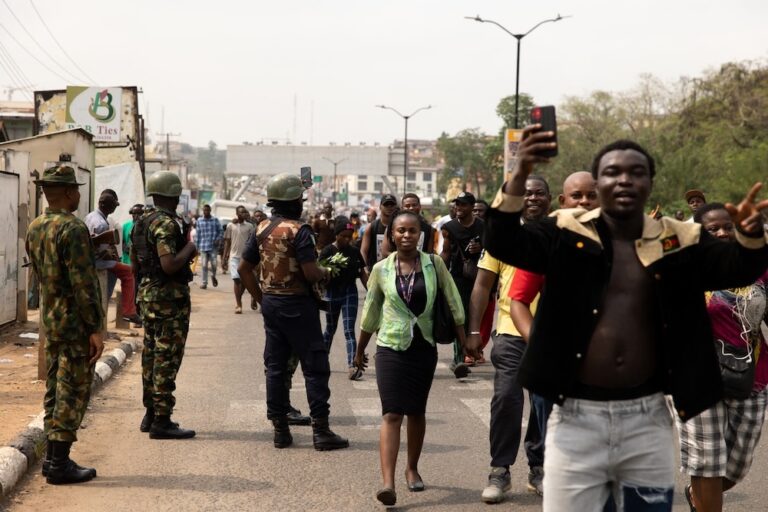(RSF/IFEX) – In October 1997 alone, five Nigerian journalists were verbally abused, five imprisoned, eight beaten and one tortured. Yet the Commonwealth member countries decided, at the conclusion of the Edinburgh summit on 27 October, not to exclude Nigeria, but only to prolong its suspension. On 1 October, Tenkum Kokoh of “The Democrat” and Folu […]
(RSF/IFEX) – In October 1997 alone, five Nigerian journalists
were verbally abused, five imprisoned, eight beaten and one
tortured. Yet the Commonwealth member countries decided, at the
conclusion of the Edinburgh summit on 27 October, not to exclude
Nigeria, but only to prolong its suspension.
On 1 October, Tenkum Kokoh of “The Democrat” and Folu Oyewusi of
the “Daily Sketch” were arrested and detained by police in
Makurdi, capital of Benue state. The two journalists were
conducting a seminar on the topic “Nigeria 98 and the Principles
of Rotational Presidency”, to mark the 37th anniversary of
Nigeria’s independence. A police spokesman in Benue State simply
said the two journalists were being held on “security matters”.
They have reportedly been freed.
On 6 October, eight staffers of Yobe State Television (YTV) were
severely beaten on the orders of the state military
administrator, Wing Commander John Ben Kalio. The administrator
was said to have been annoyed over YTV’s airing of a 45-minute
documentary on the social achievements of his predecessor, Police
Commander Dabo Aliyu. The eight journalists were beaten in
Government House and taken to a hospital for treatment, some of
them still unconscious.
On 10 October, Henry Ugbolue, the Kaduna State correspondent of
“The News” and “Tempo” magazines, was arrested by security
operatives attached to Government House, Kaduna. Ugbolue was
arrested on a street in the capital, Kaduna, severely beaten and
taken to Government House, where he was further tortured. He was
freed on the same day, but has been asked to report to Government
House every day. This arrest came after the publication, in the 8
October issue of “Tempo”, of an article written by the
journalist. Titled “Goodbye Justice”, this article reported the
sacking of 30,000 government workers by Lieutenant Colonel Hamed
Ali, the military administrator of Kaduna State. The journalist
received treatment for his wounds at a private hospital in
Kaduna.
On 17 October, Ademola Adimboye and Gbenja Alakija, two editors
respectively of “The News” and “Tempo”, were arrested and
detained at the Criminal Investigation Department (CID)
Headquarters in Abuja. No official reason was given for these
arrests. In its front page article entitled “Abacha still to
replace Abacha”, the 16 October issue of “Tempo”, which belongs
to the same group as “The News”, had denounced as “scandalous”
recent stands by the Nigerian armed forces in favour of General
Sani Abacha’s possible candidature for the presidency. The two
journalists were freed on 19 October.
On 18 October, five journalists were arrested in Ogbia Town,
Bayelsa State, while covering a rally organised by youths of the
district to protest against the activities of the Shell oil
company and the Nigerian government in the Niger Delta. Casimir
Igbokwe of “The News”, Wisdom Dike of “The Week”, Joseph
Ollor-Obari of “The Guardian”, Tokunbo Awoshakin of “This Day”
and Doifie Ola of “Post Express” were subjected to rigorous
interrogation and released hours later with a strong warning that
they not publish any story on the incident.
On 25 October, as the Commonwealth summit was at its height, Soji
Omotunde, editor-in-chief of “African Concord”, was arrested by
plainclothes policemen in Ikeja, an area of Lagos, not far from
the newspaper’s premises. The place where he is being held is not
known, nor are the reasons for his arrest. He is the second
reporter for the newspaper imprisoned: Mohammed Adamu, director
of “African Concord”‘s Abuja agency, was arrested on 27 July. He
is still in jail. This arrest, for which no official reason was
given, occurred after the publication of an article very critical
toward Ali Mustapha, President Abacha’s chief of security.
Moreover, “African Concord” has not published since the second
week of October because of financial problems not unconnected
with circulation and distribution dis
fficulties brought about by harassment from security agents.
“African Concord” is part of the Concord press group, owned by
Moshood Abiola, the undeclared winner of Nigeria’s 1993 election
who has been detained since 1994 when he proclaimed himself
President in defiance of Nigeria’s military rulers.
Reporters sans frontieres also recalls that four Nigerian
journalists have been in prison since 1995. Christina Anyanwu,
editor-in-chief of “The Sunday Magazine”, Ben Charles Obi,
director of “Week-end Classique” magazine, Kunle Ajibade, editor-
in-chief of “The News” and George Mbah, a journalist with the
weekly “Tell”, were sentenced in 1995 to fifteen years in prison
for spreading information about an alleged coup attempt on 1
March 1995. Their state of health, both physical and mental, is a
cause for concern. Nigerian prisons are known for being
overcrowded and providing appalling hygienic conditions. Scabies
and typhoid fever which are currently raging in Kaduna prisons,
where Anyanwu is being detained, are said to have killed five
prisoners in the first three weeks of October alone.
RSF expresses its deepest concern regarding the fate of
journalists and the independent press in Nigeria, which is now
the African country where freedom of expression is systematically
violated more than any other. The organisation renews its call to
the Nigerian authorities for the unconditional release of the six
imprisoned journalists. Moreover, RSF invites Commonwealth
members to determine the process of Nigeria towards
democratisation and the way back to civil rule, planned for
November 1998.


